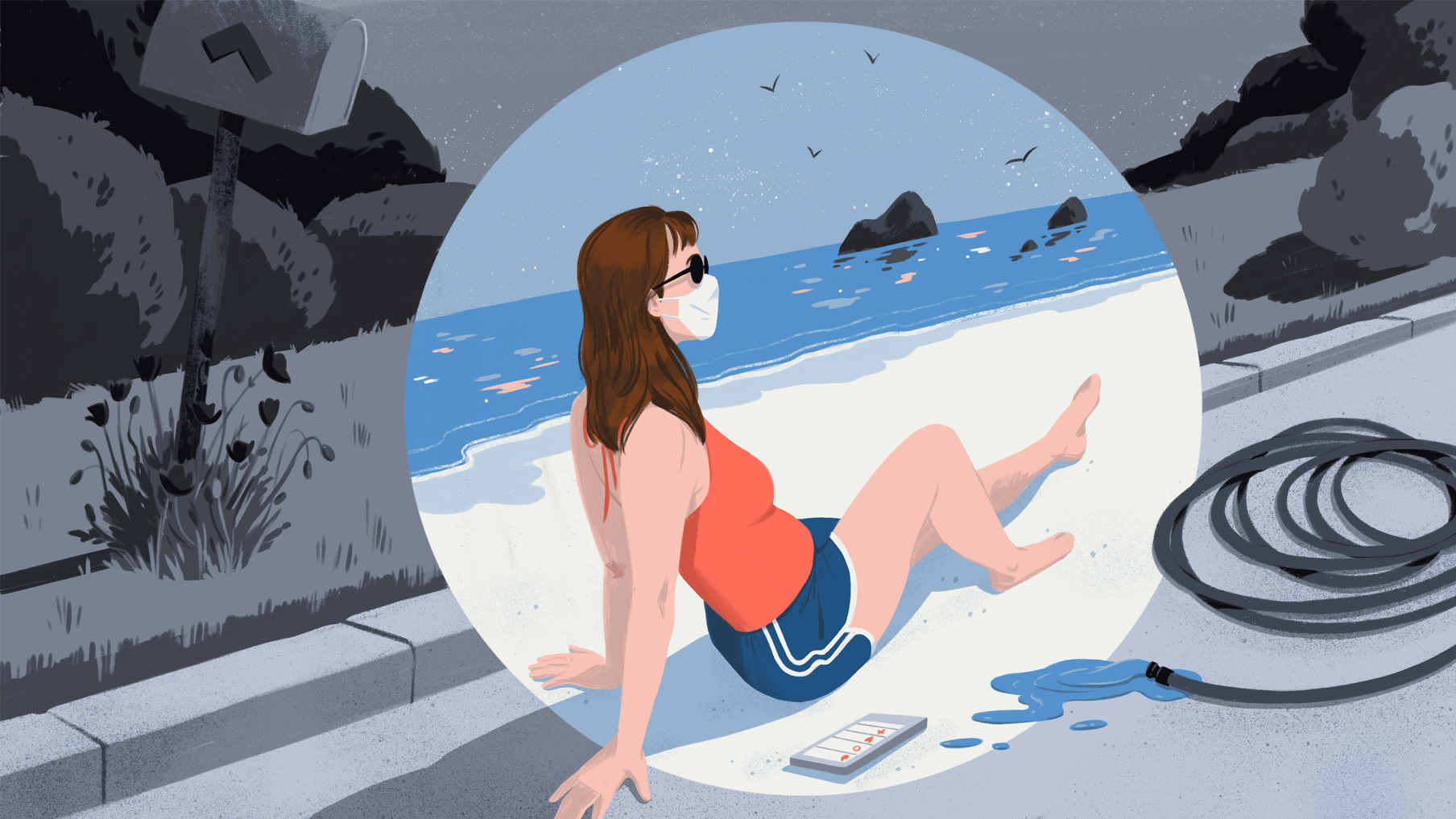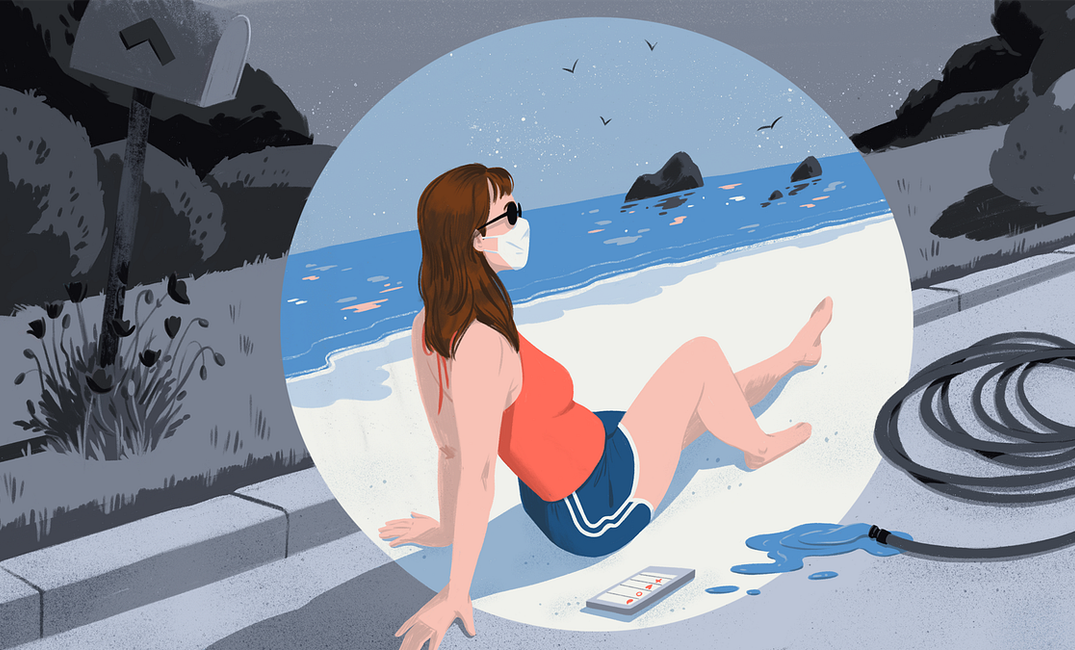
I’ve swapped my T-shirt and sweatpants for a halter swimsuit from Target. Sitting on a towel on the concrete outside my Mill Valley home, I haven’t worn a bra with underwire for weeks — months maybe. I’ve decided to indulge in the fantasy that I’m on a sandy beach, about to dip into the ocean. Beaches have always been my go-to visualization for calm, perhaps because I grew up by the North Sea.
But my daydreaming is quickly interrupted by my own reverie by thinking, “Are my boobs sagging?”
Sign up for The Bold Italic newsletter to get the best of the Bay Area in your inbox every week.
I’m 34. The thought stems from a remark I remember a girl saying in middle school: “Once you can hold a pencil under your breast without it falling, it’s time for a bra. After that, don’t go without. You’ll get saggy.” I’m surprised; in my weeks in quarantine roaming free, I wasn’t conscious of any concern about my lack of undergarments until now. I panic slightly.
The voice of performative femininity is relentless, whatever a woman’s age.
A decade earlier, in my mid-twenties, I stood in a bookstore with my aunt, who generously offered to buy me something. I handed her Nora Ephron’s essay collection I Feel Bad About My Neck. “Are you sure you’ll find her relatable?” she asked. “She’s writing about menopause.” I did relate. In one chapter, entitled “On Maintenance,” Ephron describes the energetic and monetary resources required to keep up her appearance and to just look like herself. As for me, I bounced from nail salons to blowout appointments I couldn’t afford like it was barhopping.
Now I’m not doing any of it. The nails. The hair. Some people say this pause in our broken world is forcing us to sit still long enough to notice our priorities. Maybe that’s wishful thinking. Since the lockdown, my sister and I have filled our texting thread with jokes about waning beauty routines. In one of my first messages, I share the fear that without regular visits to my local waxing studio, I’ll end up with a visible mustache. My sister replied with an edited version of the Mona Lisa with her roots showing. The caption: Corona Lisa, as if the worst way one could come out of this traumatic time period would be with gray hair.
The voice of performative femininity is relentless, whatever a woman’s age. During a recent conversation with my five-year-old niece, she said her little sister’s diaper package has a baby on it that looks like it’s wearing lipstick. Then she asked, “Don’t you agree babies are too young to wear makeup?” “Yes,” I replied. “Definitely.”
On a video call with one of my peers, I noticed she’d coated her lashes with mascara. I found myself asking whether I should have also, like there was a manual for life during a pandemic. These thoughts about my appearance bothered me. That this was who I was during a global crisis. Here was another megabyte of mental space wasted on wondering about the feminine beauty ideal.
As a straight, white, abled, young, cisgender woman, I realize that I have the privilege to be bothered about such frivolities in a moment like this. So many others don’t get an opportunity for daytime musing, and if they did, their stories would be bigger than the struggle to let go of a constant meditation on how I appear to others. Which is why, in normal times, I do what I can to counteract oppressive beauty standards. My acts feel small but significant to me, like redirecting table conversations when they turn to guilt about eating dessert. What’s the point of ordering ice cream if we can’t enjoy it?
I feel lucky to be born into this era of women that, on the surface at least, upholds values of body acceptance. That we don’t live in the time of the fictional Mrs. Maisel, who wakes up earlier than her husband to ready herself so he’ll never have to see her without full hair and makeup. When I find myself slipping backward with thoughts about my “imperfect” body, I think of the activist and writer Sonya Renee Taylor, who, in her 2018 book, The Body Is Not an Apology, writes:
We humans are masters of distraction, using makeup, weight loss, and a finely curated self-image to avoid being present to our fears, even as they build blockades around our most potent desires.
Every time I think I’m finally at peace with myself, a voice creeps in. “Ha! Fooled you!” The home-cooked food I’m preparing during our time at home nourishes both my physical and emotional self — here’s looking at you, truffle mac and cheese. But on my daily walks, my eyes wander from the birds and trees in my area to the step counter on my cellphone, and I’m forced to check my intentions. Is this walk about health of the body and spirit or something else? What if the naturalist John Muir, whose name graces signs in my Marin County neighborhood, were here? When he walked and wrote, did he concern himself with calories burned or the nature that surrounded him?
And so, in moments when I’m hyperfocused on looks, I try to remember the compassionate response. When I was a child, my mother told me I’d need to live in the gray. “Life’s not black-and-white,” she said. In my all-or-nothing universe, I was seeking control. Staying home, in this stressful world, I know what she meant. At least I’m starting to catch myself when my mind wanders off to the controlling mode. The noticing is a new beginning, they say in the mindfulness world. And I tell myself it’s okay. It can be overwhelming to realize how little you’re in control right now.
I’ve noticed that compassion, at least, seems a little more accessible to women these days. “It’s okay if your child is yelling in the background,” we tell family and team members working from home. “We understand you’re tired. Parenting is tough right now.” These messages in the ether and the media give me hope that we’ll stay this patient and understanding about our common humanity, even as the world starts up again. “We’re all doing our best” is our most common language today. What if we could always hold the range of emotion in our human condition this kindly — whether fear, loss, rage, angst, or fatigue?
Historically, I haven’t been compassionate, least of all to myself. For many years, I’d been an avid dieter, picturing 15 pounds lost and the shinier future that would bring. I’d made a habit of putting my real self on hold until I was thinner, which is profoundly unkind. Living felt conditional, and I did hold myself back until some indeterminate day where I’d step into my power to experience love, belonging, body acceptance, even simple joy.
As the afternoon sun leaves sweat on my skin and I wish the cement under me was indeed sand, a few steps from the water, I’m reminded of a quote by the writer Anne Lamott:
What if you wake up some day, and you’re 65, or 75, and you didn’t go swimming in those warm pools and oceans all those years because your thighs were jiggly and you had a nice big comfortable tummy; or you were just so strung out on perfectionism and people-pleasing that you forgot to have a big juicy creative life?
I don’t have access to the pool Lamott recommends, but I do have a garden hose. I rise from my towel and turn it on, letting the water cool my skin. In that second or two, I’m nowhere else than in this place, focused on sensation and caring for my body, rather than trying to control it.







